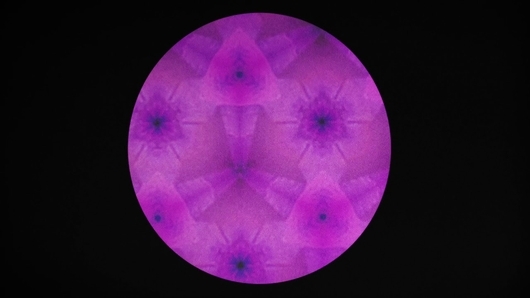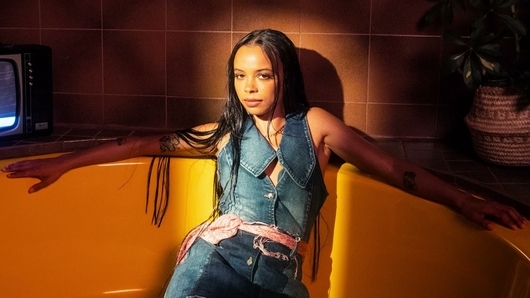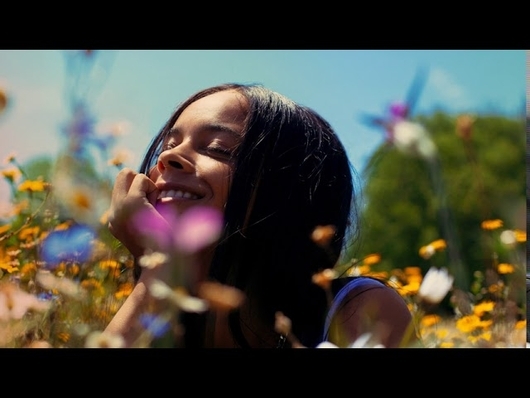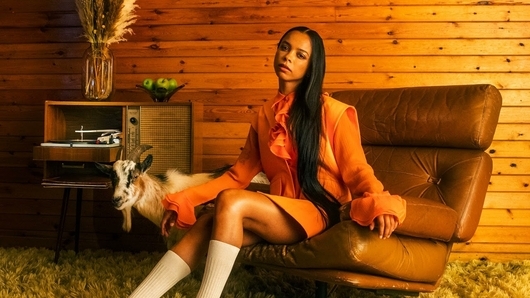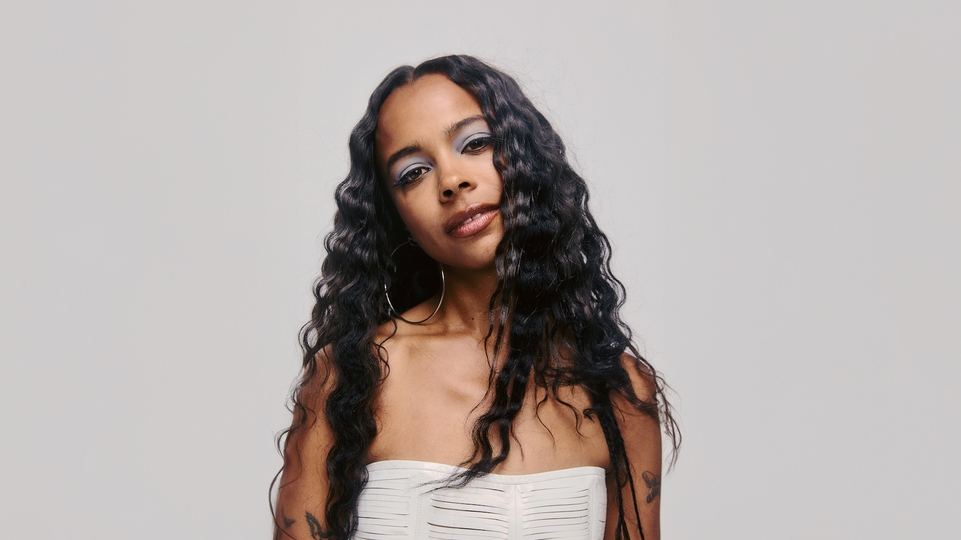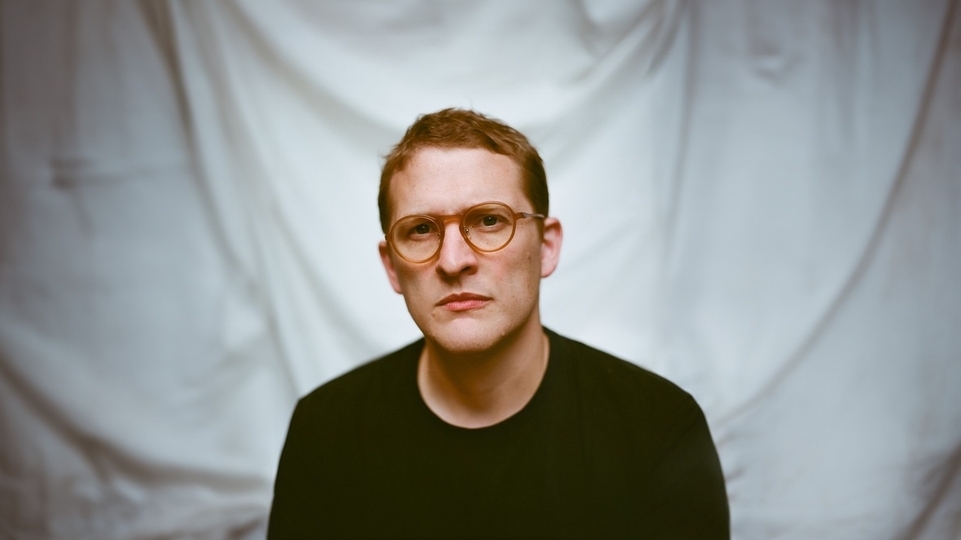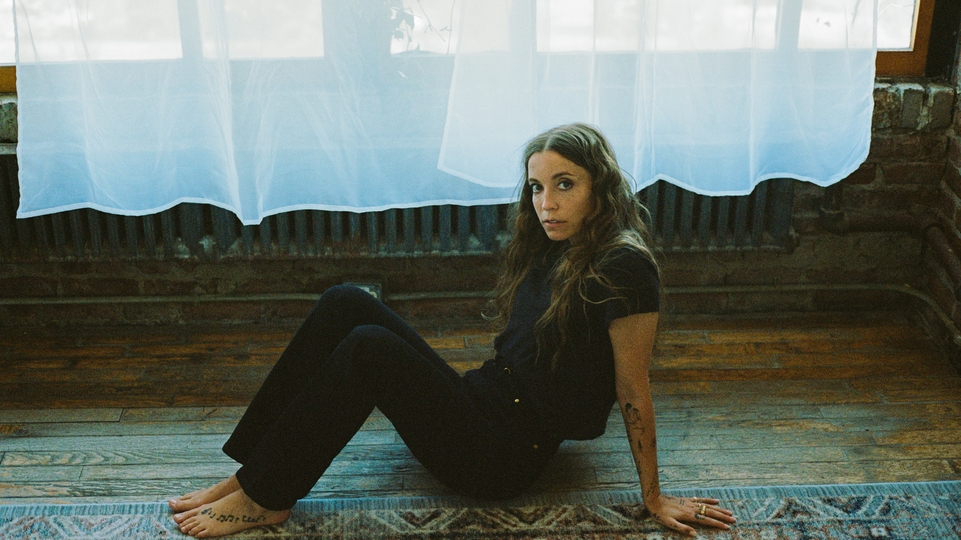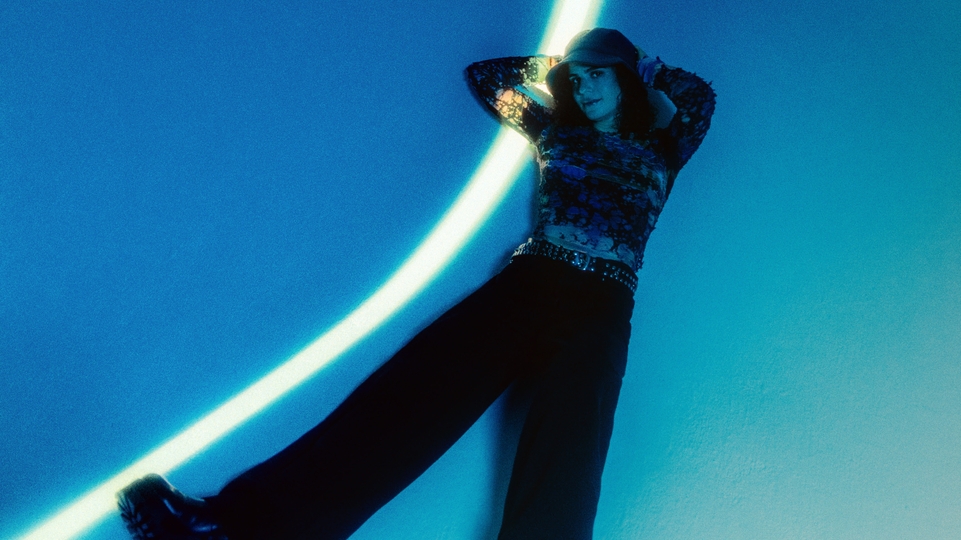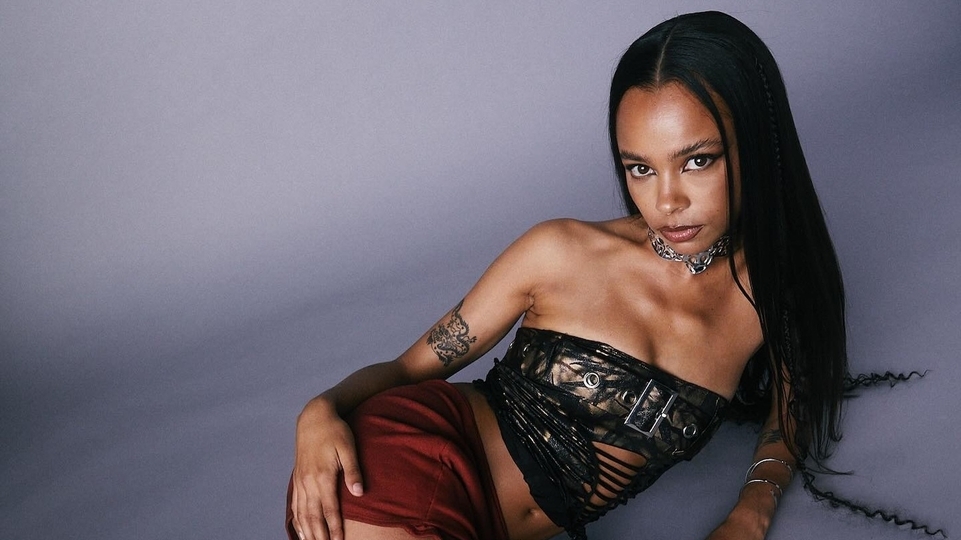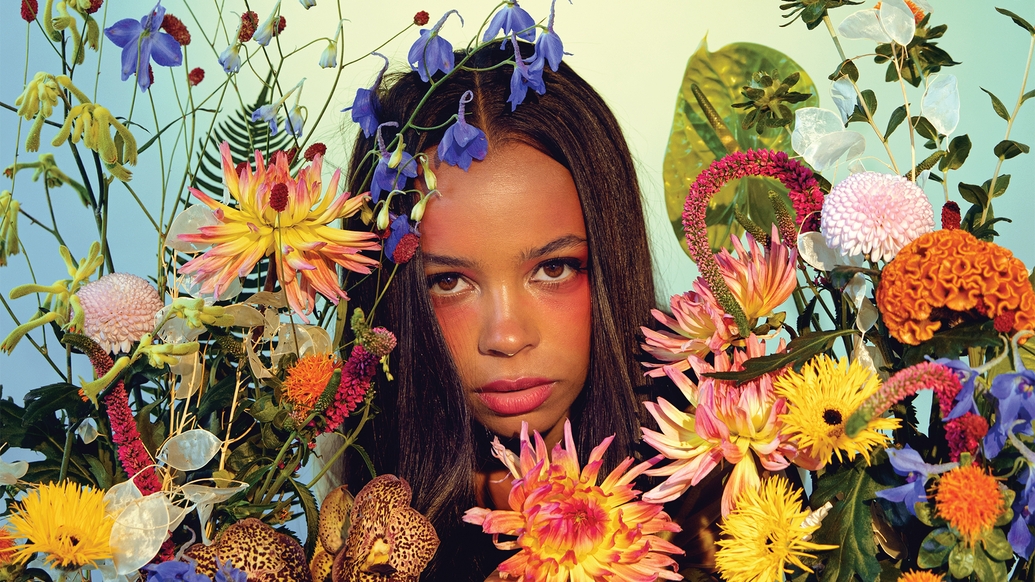
TSHA: In full bloom
London-based DJ, producer and live artist TSHA has risen rapidly in the scene, and is receiving her flowers with grace. But it hasn't always been easy. As she prepares to release her stunning debut LP, 'Capricorn Sun', on Ninja Tune, she speaks to Amy Fielding about overcoming online trolls, astrology, the art of DJing and more
Across one bitterly cold weekend in February 2017, Ninja Tune’s revered live act Simon Green, AKA Bonobo, descended on South London for two sold-out performances at Brixton Academy. While the artist filled the room with the intangible euphoria that his live shows provide, a young Teisha Matthews, who had been grappling with the direction of her sound and career as an artist, experienced a defining personal moment in the 5,000-strong sea of fans.
Now better known now by her stage name, TSHA, Matthews had been DJing house and rave tracks, and producing them, for a short while at that point. But emotionally, she was connecting with the blissful sounds of artists like Bonobo, Four Tet and Maribou State. A friend had offered her a ticket to the gig last minute; little did she know that accepting it would be a life-changing decision. It was the moment her vision bloomed. Matthews envisioned herself on stage, performing with a live band. Almost two years to the day of that sold-out performance, her track ‘Sacred’ — reminiscent of those producers whose music had touched her sensitive nature — was released as part of Bonobo’s 2019 ‘fabric Presents’ compilation.
Fast-forward a further three years, and TSHA has quantum leaped from unknown artist to mainstage mainstay and club headliner. On festival line-ups, she’s often found in the company of house and techno titans like Derrick Carter, Floorplan, Moodymann and Honey Dijon, and outside of summer season, she’s igniting club dancefloors from the Midlands to Miami. Matthews’ rise has been dizzying — even becoming the face of Spotify’s EQUAL campaign in 2021, highlighting the past, present and future of women in music — but she’s still receiving her flowers with grace.
This October, Matthews is set to release her debut album, ‘Capricorn Sun’, via Ninja Tune — another full-circle moment. On the roster alongside artists like Jayda G, Bicep, Floating Points, I. Jordan, 박혜진 Park Hye Jin and Ross From Friends, the album — produced with live performance in mind — pieces together brand-new productions with tracks from various EPs and singles Matthews has already released on the imprint, recontextualising them in a 12-track body of work that feels alive with empathy, positivity and emotion.
When we speak with Matthews on an August afternoon, she’s in Italy, just waking up from a late night in the club. The performance is part of her intense Summer ‘22 tour, taking in 28 dates over two months across the globe, marking what has been the biggest year yet in TSHA’s career. She smiles sleepily as she shares details of last night’s gig in San Morino, peppered by yawns as she promises, “You’re not boring me — I’m just tired!” with a giggle. Although constant touring and releasing music via Ninja Tune is the daily grind for Matthews now, her journey to date has been one requiring patience and determination.
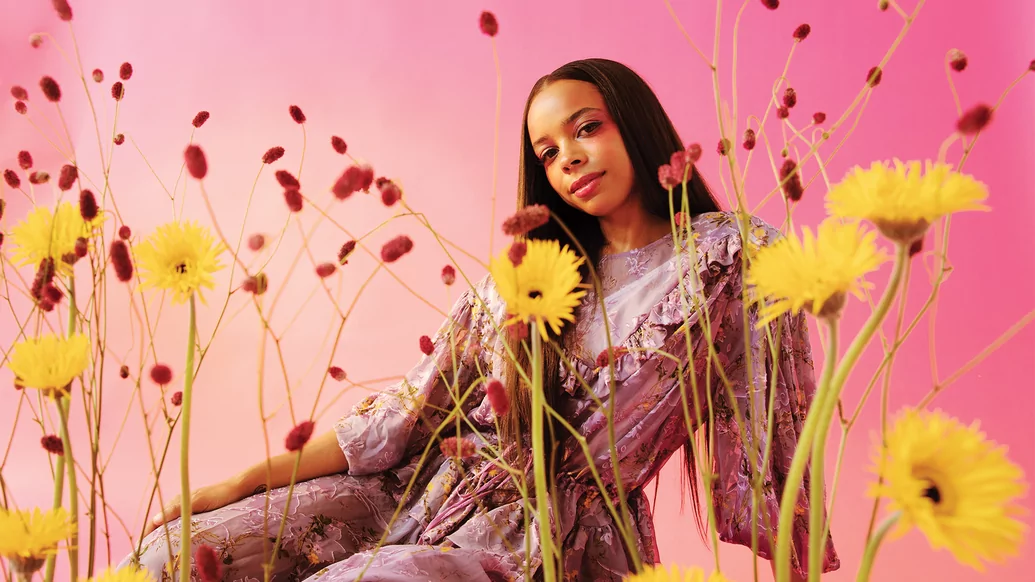
While the music that Matthews makes is sensitive and soulful, her DJ sets are worlds away, bursting with bold, vibrant, feel-good, hands-up energy. They’ve seen her secure a residency with Ibiza’s legendary Circoloco and grace big festival areas, from Glastonbury’s iconic Arcadia spider and The Valley at Manchester festival Parklife, to Annie Mac’s Maltese shindig, Lost & Found, DGTL Amsterdam, and Snowbombing, among others. On stage, Matthews dances and engages with the crowd, bringing an infectious energy that’s palpable. She blends catchy dance classics with purpose-dug underground bangers, and looks confident and controlled, radiating positivity.
Although larger than life on stage, and bright-eyed while we speak about last night’s event, Matthews suffers with anxiety, and has struggled to connect with her identity as a DJ — even more so now she is under a microscope. Last year, a live stream resulted in a misogynistic attack from strangers, who commented on her appearance and performance, and made Matthews question everything she’d experienced up until that point. “It really knocked my confidence,” she says earnestly. “All because I wasn’t wearing a bra or whatever. I felt unlucky because I’ve seen people wearing similar outfits before, and I don’t know what it was that made people want to jump on me, unprovoked, when I’m just minding my own business. It’s not even something I’d ever even worried or thought about before that.
“I came away from it feeling really good, it was one time I actually felt good about my set. Then the next day after it went online, I saw all the comments and what had happened, and I just cried my eyes out for two days. People ruined it for me, it was like they’d taken away my experience of it. I didn’t want to do live streams anymore.”
A similar incident transpired earlier this year, at Belfast’s AVA Festival. After making her debut for Boiler Room, the artist posted on Instagram, explaining how she hadn’t found out the performance would be a live stream until it was too late. Citing the bad feelings from her previous live streams, Matthews wrote: “Not sure I’ll ever do a live stream again and as dramatic as it sounds been contemplating whether I want to DJ anymore at all. I’m struggling with the ups and downs, comparing myself to others and just not feeling good enough ever no matter what I do. Comparison is the thief of Joy and SOCIAL MEDIA is the icing on the cake.”
That joy from DJing is something that Matthews has been struggling to reconnect with recently, and she admits that these days she largely feels “numb” about performing, and unable to determine whether she’s played a successful set or not, instead relying on the opinion of others. Even more recently, when she was tapped by Pete Tong as a mentor for his online DJ academy, alongside huge names like Carl Cox, Jamie Jones and Nicole Moudaber, those bad experiences with performing led her to decline the initial invitation. It wasn’t until a phone call from Tong, who reinforced his belief in her skills and ability, that she agreed to take part. “You can’t say no to Pete Tong,” she laughs.
It’s something, in part, that has brought her to the place of her next levelling up. Slated for release on 7th October, ‘Capricorn Sun’ signals a new start for TSHA, the artist and producer, following her trials and tribulations as a DJ. She’s laying down roots for new beginnings, while tapping into the music that gives her joy to produce and regrounding herself in the human elements of being an artist. It’s overflowing with emotions: from euphoria, hope and ecstasy, to solemn moments strung from soft melodies. It’s brimming with intimate experiences and personal connections, and comes from a deep, long-standing love of electronic music that started at home.
Born and raised in Fareham, a small town outside Portsmouth, TSHA is the youngest and only sibling of a music-obsessed older brother, Colton, who’d play garage and jungle at local DJ gigs and parties, and the daughter of a seasoned free-raver with a love for anything with bass — “My mum actually loves Skrillex,” she laughs. Her father was “around for a year”, but she wouldn’t see him again until she turned 17. While her brother was mixing London-centric dance sounds rarely heard among her peers, TSHA was absorbing everything in the comfort of her own home. “His decks were in the living room and I’d just dance for hours,” she remembers. “He’d blast it till a certain time so the neighbours wouldn’t get annoyed, and I’d ask questions, and look in the record box and pull things out like ‘What’s this?’”
As she moved into her teens, Matthews’ brother began to struggle with addiction, and after he sold his equipment — though Matthews still has his records to this day — the house fell semi-silent. Growing up in a single-parent household, at a time when purchasing physical music was a luxury to many, the introduction of the internet into TSHA’s home when she was 14 changed the game entirely. Using file-sharing software on the home PC, she discovered a whole new world.
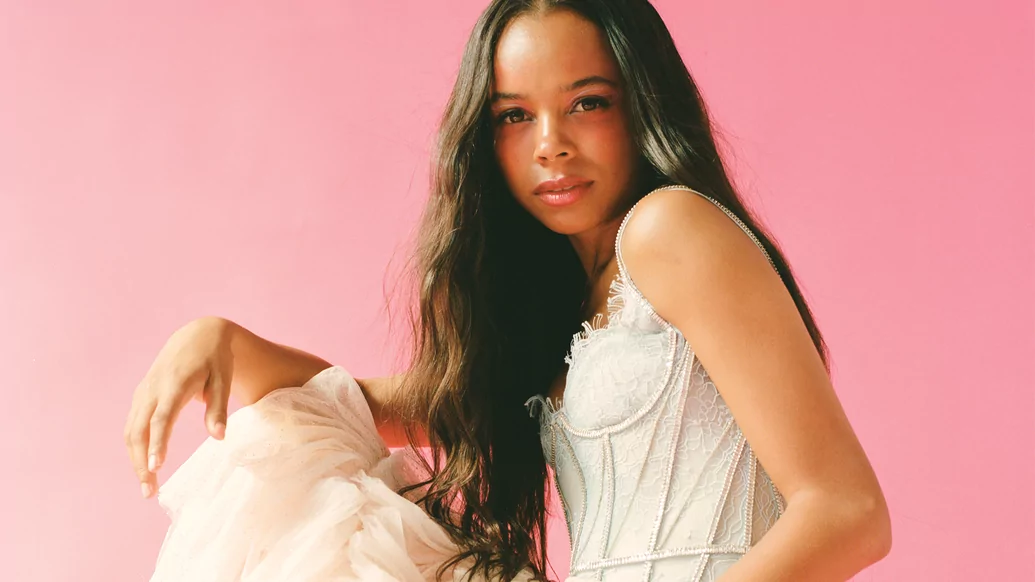
“I was starting to learn about Chicago, about the kind of people who were involved in house music — queer people, Black people, Latino people. It felt like a safe space, and that made me really, really, really fall in love with it.”
A typical TSHA DJ set in 2022 pits breaks, rave anthems and her own beefier productions against acid house, stone-cold dance classics and sounds from Chicago. Her BBC Radio 1 Essential Mix dipped into records by the likes of Deep Dish, Supertramp and The Revolutionaries, blended with newer sounds from Ninja Tune co-sign DJ Seinfeld, Rotterdam’s Kessler, and Bored Lord. That Boiler Room set at AVA served up Groove Armada’s ‘Superstylin’’ alongside cuts from imprints like Beat Factory and Alex Virgo’s Pomme Fritte. It’s a stark contrast to the majority of TSHA’s productions, and its roots lay in those experiences with her brother, and her discovery of the world wide web. “YouTube had just started becoming more of a thing back then,” she remembers, “and I came across a weird Chemical Brothers music video on there, and thought it was so cool. I did the same with The Prodigy... but I was downloading on LimeWire too. Remember LimeWire?"
“In fact, I remember on my 16th birthday...” she trails off, laughing at herself — something Matthews does endearingly often during our conversation. “I made a mixtape of all this UK rave stuff, and I think everyone was a bit confused. At school, we were all listening to R&B, hip-hop, Beyoncé and Sean Paul, you know, that standard kind of stuff. But, because of my family, I think I was the only one that had any understanding of dance music and the culture. It was my first ever party and in my head I wanted to make a rave... but no one was on it that much.”
While she loved dance music and the culture, she struggled to find an “in” in Fareham. There were no plans to consider it as a career path, and her request for decks at 16 was naturally denied after her mum had invested in her brother’s original setup. Undeterred, Matthews attempted to mix drum & bass some her friends who were also MCs, but being a novice, and confronted with the combination of drum & bass and vinyl, it proved tricky.
Another key moment in Matthews’ musical awakening was her first introduction to house music. Back in Fareham, though she scooped a gig as a hip-hop DJ in her late teens at a local club called Motion, the clubbing experiences were limited: think Liquid, chain pubs and cheesy bars. After being exposed to so much eclectic music, both through her family and her own early digging online, Matthews knew she had to look further afield. She attended the University of East London, enrolling in Dance: Urban Practice. As part of the course, she studied a module in house music and dance. “We were learning about hip-hop, and locking, and other styles of dance,” she says, “but [the history of house] just really caught my attention. I had to write an essay about house dance, but there was hardly any literature on the subject, so I had to really find out about house music to understand how to dance to it.
“I was starting to learn about Chicago, about the kind of people who were involved in house music — queer people, Black people, Latino people. It felt like a safe space, and that made me really, really, really fall in love with it.”
Another experience that London gave Matthews was the beloved and now-defunct Trocadero in the West End. A huge entertainment complex on Shaftesbury Avenue, sponsored in its past by the likes of Pepsi and video game giant SEGA, the megaplex of neon lights and arcade machines provided a backdrop for dance troupes and music lovers. “We’d go to Trocadero after uni, and there’d be dancers doing different styles in each part of the ground level,” she says. “It was a really beautiful community, actually. There’d be people there who were world champions.
“I’d literally just ask questions like, ‘Can you show me this dance?’ Or you could even just hang with them. It really got me into house music even more, and wanting to understand where it came from. That’s when I knew I wanted to DJ.”
Matthews had seen the light, and soon after that module, she took up DJ lessons with BBC 1Xtra’s Melody Kane, dropped out of university at 18, and began to envision a career in the world of house music. She began distributing mixes — era specific, funk, disco, you name it — to platforms, and on the side worked a gig as a mobile DJ playing at weddings and other events. “Eventually I got on a few agencies, and started to get work,” she says — and it was hard work. “I was, really, the only female DJ who had my own equipment. Most of them just didn’t want to carry it, or needed it hired. People would laugh at me while I was setting up,” she remembers, shaking her head at the memory. She lights up as we both laugh at the image of a younger, smaller TSHA charging into the venue loaded up with kit.
“I had the full setup: speakers, the booth, lights. I also had this really cool trolley I always tell people about, you can fit everything on it. It made my life so much easier — it was really strong and German- made...” Matthews’ flow is briefly interrupted by her hotel reception calling to see if she’d like her room cleaned. “Because I travel so much I normally unplug the alarm clock and the phone, but I must have forgotten,” she says. “I’m leaving today anyway...”
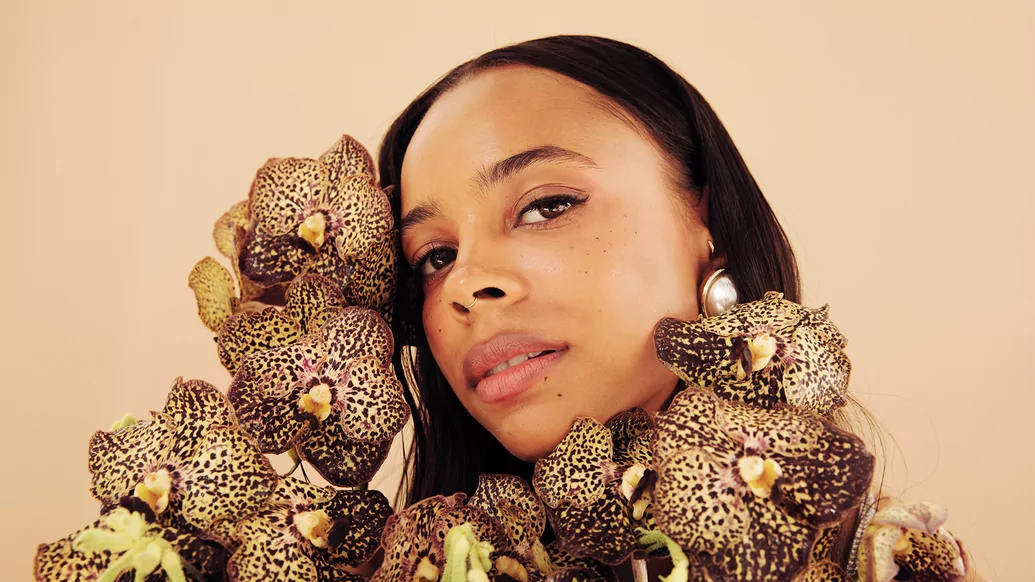
After that pivotal moment of seeing Bonobo in Brixton in 2017, Matthews’ debut EP, ‘Dawn’, landed in the summer of 2018. Self-released, financed by her mobile disco gig, she made the tracks on Ableton — learning to navigate it with tips from friends and online tutorials — after failing to click with Logic. “Ableton allowed me to be intuitive,” she says. “Obviously, what I was making in the beginning was shit, but I realised I could at least make something. I had a cracked copy of it at the time, and was just using the built-in instruments and samples I found.”
The resulting three-tracker consisted of glittering strings, lush melodies and trickling percussion, and most importantly, introduced TSHA as an emotive storyteller. ‘Can You Hear Me’, a perfectly chilled slice of deep house, encapsulates sad, soft summer afternoons, while ‘Badadaba’, a Four Tet-esque, four-minute journey through plucked harps and emotive vocals, conjures feelings of bliss and relaxation. A string of EPs and singles have followed — like 2019’s ‘Moonlight’, which was tapped by Ninja Tune sub-label, Counter Records — emanating more of the same cosmic and comforting sounds that have become a signature of TSHA’s productions. As well as remixes for Soothsayer and Anjunadeep, TSHA has dropped her own ‘fabric Presents’ compilation — “very acid house. I love the idea of old skool rave culture” — and, in 2021, launched her own Jackfruit Radio show on Apple Music. Described as accessible and open-minded, the show features music and intimate conversations with guests like Rhythm Section’s Bradley Zero, Effy, Daniel Avery and Maribou State.
London-based DJ/producer, Effy, is also one of Matthews’ best friends. The two connected during the first coronavirus pandemic, becoming a “bubble” together to take walks during the London lockdown. It’s a warm voice-note sent from Effy to Matthews, layered with soft keys and drawn-out synths, that sets the tone for ‘Capricorn Sun’ on album opener ‘Galdem Intro’: “I’m all talk. I’m telling you to believe in your sauce, and I don’t even believe in my own!”
The idea for ‘Capricorn Sun’ became a reality prior to the pandemic, and it’s being launched with a new goal in mind. Although those tense incidents with live streaming and the peak of performance anxiety hadn’t yet occurred, Matthews was already envisioning herself as a live performer as opposed to a DJ, inspired by those early brushes with Bonobo, and taking the downtime to reframe her art. She took older productions and massaged them through her new reference points, building a bank of refreshed music that aligned with her vision. “We didn’t know when live music would be coming back then, which is why I released that EP,” she says, referring to ‘Flowers’, her four-track lockdown release that dropped in November 2020.
One of the EP’s highlights, ‘Sister’, has in turn become a standout on ‘Capricorn Sun’. While Matthews had an inkling that she may have more siblings than her older brother, and the half-brothers and sisters she knew about, it was during the lockdown that she also connected with a sister she’d never known of before, after her father — who had been absent for over a decade — reached out over Facebook. She scanned his profile and spotted a comment on a baby photo from Amy, who turned out to be the sister she’d always wished for. “We started chatting and had a long phone call. We really connected,” she says. “It was a really nice thing in lockdown, and before I got busier I managed to visit her and meet her children. It’s great to have a big sister.”
Those moments of intimacy and heartfelt affection on ‘Galdem Intro’ and ‘Sister’ can also be heard on tracks like ‘Nala’, an ode to Matthews’ cavapoo puppy of the same name, brimming with playful, bright energy. Femininity flows throughout the tracks on ‘Capricorn Sun’, but it’s not necessarily something that was intentional. “Maybe just because I’m a woman, my mind works slightly differently to the guys who are producing this kind of sound,” she says thoughtfully. “There definitely is a feminine side to it... and it does nod to a lot of things, you’re right: femininity, friendship, girl power... I guess that’s what it does encapsulate, actually.”
In astrology, Capricorns are represented by the sea goat, a mythical aquatic creature that is half-goat and half-fish. As personality traits go, Capricorns are considered ambitious, organised, determined, sensitive and loyal, while also self-critical, pessimistic and stubborn. “I take that stuff with a pinch of salt, of course,” says Matthews, discussing the astrological ties between the stars and her chosen album name. “But it’s fun, and I love the idea of being a Capricorn sun and how much each part of the sign relates to me and my personality. Even the album artwork, it’s me with baby goats, and each goat is meant to align with a specific part of my personality.
“It’s almost like I’ve called the album TSHA, but just in a different way,” she adds. “Taking that Capricorn stance of ‘This is me, this is my music, this is my personality’.”
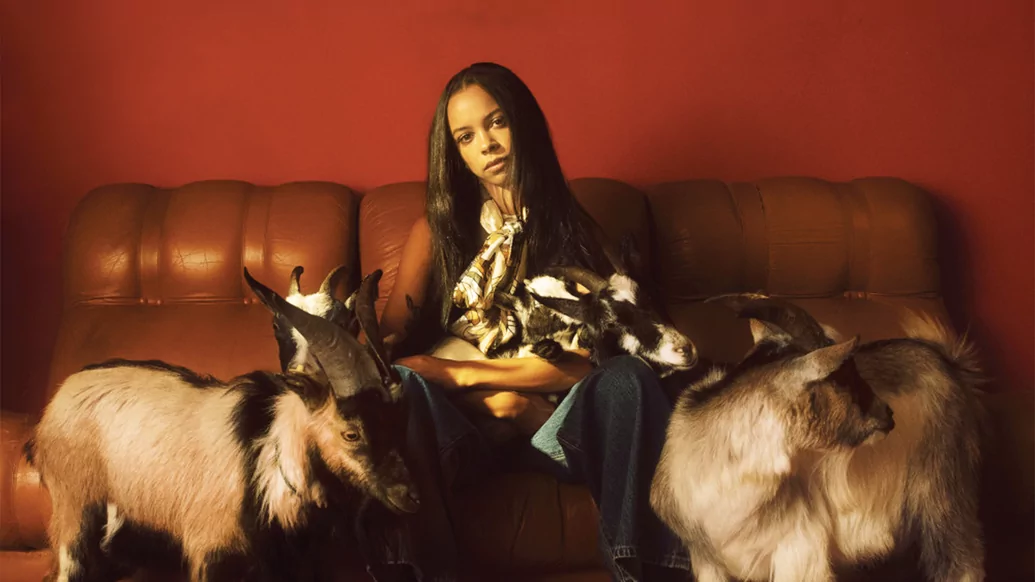
“I think people need to get rid of this notion that just because I have a bad experience with my job, it doesn’t make me ungrateful. I’m so incredibly grateful to be doing what I’m doing"
Throughout the album, there’s whispers of other artists who create powerfully moving music, like Bicep, Anjunadeep’s Lane 8, UK duo Disclosure, and Tycho. ‘Running’, for instance, is a masterclass in human feeling, evoking emotion through layers of sound that slowly build into a euphoric crescendo. Another beautiful moment is served by five-minute cut ‘Water’, which features a vocal sample from Malian artist Oumou Sangaré, an internationally renowned, Grammy-winning singer, composer, business pioneer and activist, who champions women’s rights in her native Mali and throughout Africa.
As well as the sample from Sangaré, there’s a small handful of collaborations on ‘Capricorn Sun’. “I prefer working on my own, mostly,” Matthews says, “unless it’s people I know. I can’t do those random studio sessions because I just get really nervous and freak out. If I really know you, and I’m really comfortable, it’s cool, but being on the spot isn’t for me.” Two of the album’s tracks feature singer/songwriter and producer Clementine Douglas, who she met through her publisher, and there’s also ‘OnlyL’, originally released in June last year, that features queer, London-based dance music duo NIMMO.
One of the collaborators on the album is extra special. London-based Mafro, who has worked with mainstream artists such as Sean Paul, Dua Lipa, The Kooks and Ella Eyre, and released his debut solo single this summer, is also Matthews’ partner, to whom she recently got engaged. Their production, ‘Giving Up’, is a soaring exploration of nostalgic breaks and vocals, bringing in elements typical of both the producers and partners in life. With ‘Capricorn Sun’ ready to be released into the world, it’s the first step Matthews is taking to step away from being recognised purely as a club DJ, and to follow in the footsteps of the live electronic performers who inspire her.
This year, Matthews was also announced as part of YouTube’s Foundry Class of 2022, an incubator for independent music, supporting indie artists at all stages of their careers through annual artist development classes and ongoing release support campaigns. “It’s really exciting because I get to release some visuals to go with the album,” she says. “It’s the first time I’ve actually had money to do a music video. I already have my ideas, so I’m looking forward to making that happen with the funding that we’ve got from [YouTube].”
As 2022 comes to a close, Matthews still has a long list of dates in the US, has spent the summer with DC-10’s Circoloco tribe, who she credits with creating a space in which she’s “never felt more welcome”, and will take in three dates across New Year in Australia. She’s also part of the only all-Black artist line-up at this year’s Amsterdam Dance Event, alongside legendary house names like Floorplan, Honey Dijon, Kerri Chandler, and Suze Ijo.
For now, though, it’s time to focus on the new evolution of TSHA, and the books have been closed to more gigs. It’s part professional, part personal, she explains, and circles back to that need to seek joy. “I think people need to get rid of this notion that just because I have a bad experience with my job, it doesn’t make me ungrateful. I’m so incredibly grateful to be doing what I’m doing, but it doesn’t mean I’m happy all the time doing it, or that it’s easy. Your whole personality and what you’re doing become linked when you do a creative job.
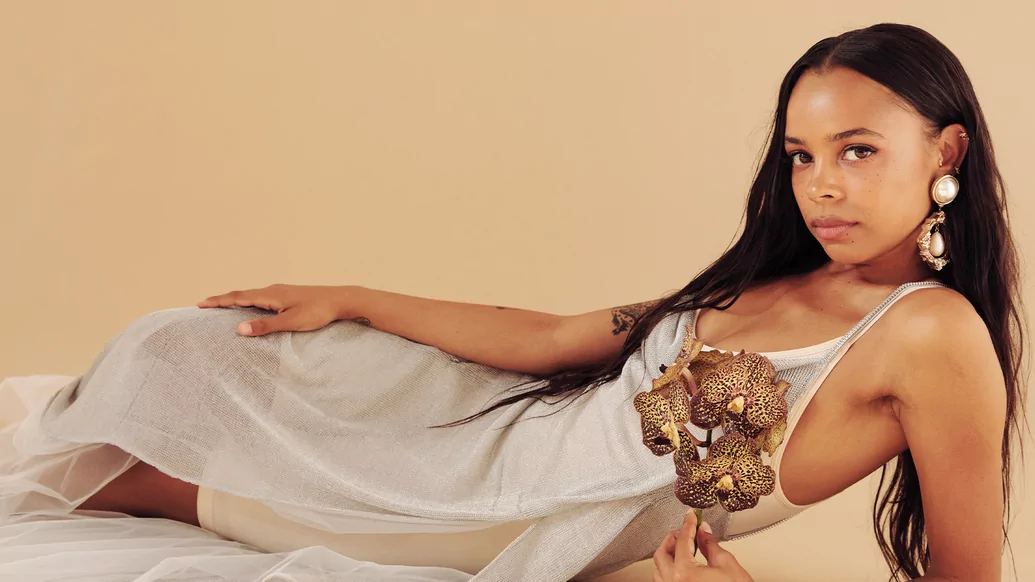
“It’s not a hobby anymore when it gets to this level,” she continues, considering her career trajectory, and the toll it’s taken. “I’m not living my high anymore. I’m DJing multiple times a week, on a plane for eight hours, up at 4AM. It’s a stressful job like anyone else, except my hours are all over the place. People tell me I’m lucky to travel the world, but I see the hotel, then the club, then my hotel again, then I fly home. I don’t even get to see half the countries I go to.”
While Matthews is still finding her path, ‘Capricorn Sun’ is a gentle introduction to her new journey, carving out fresh channels to carry her sound. It’s a blossoming, and the start of a transition to live performance, but there are still choices to be made. “I don’t know if I’ll ever fully stop DJing,” she says. “It is kind of weird thinking about me playing somewhere like DC-10, in comparison to the music I’m putting out with the album. I don’t know how, but it just seems to work.”
Perhaps one cold February sometime soon, we’ll be making the short walk from Brixton station to the Academy, to watch TSHA entrance 5,000 fans, and maybe even give someone else their defining moment too.

